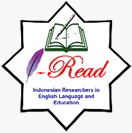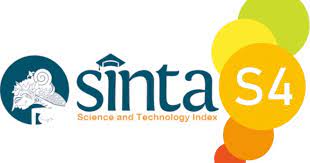Exploring Teachers’ Instructional Strategies to Facilitate the Oral Fluency of EFL Beginner Level Students
DOI:
https://doi.org/10.22219/englie.v4i2.26785Keywords:
Instructional Strategy, Teaching Oral Fluency, Beginner LevelAbstract
Speaking is a crucial skill in everyday life, encompassing various sub-skills such as oral fluency. However, teaching speaking effectively is a challenging endeavor, as developing good oral fluency requires time and effort. To enhance students' oral fluency, English teachers employ various instructional strategies. To investigate these strategies, the researcher conducted a descriptive study utilizing interviews and observations. The study focused on two English teachers instructing speaking classes at an Islamic private school in Sidoarjo, which offers an International Class program called M-ICO (Muhammadiyah International Class Orientation). The findings revealed that teachers employed student-led activities such as presentations, discussions, and game-based learning to facilitate students' oral fluency; choosing learning materials that can boost students’ oral fluency; using questioning frequently. Additionally, the study identified several speaking difficulties faced by students, such as classroom management issues, linguistic challenges, inhibition, and reliance on their mother tongue. To address these issues, teachers employed strategies such as providing challenges or games, encouraging the use of dictionaries for pronunciation learning, normalizing mistakes, and motivating students during the learning process. In conclusion, teachers adapt their instructional strategies and address concerns based on the unique conditions of their classes. These findings have implications for educators to improve students' oral fluency through strategic approaches. Furthermore, future research should explore the relationship between Islamic values or materials and oral fluency in the context of Islamic school environments.
Downloads
References
Alrayah, H. (2018). The Effectiveness of Cooperative Learning Activities in Enhancing EFL Learners' Fluency. English Language Teaching, 11(4), 21-31. http://doi.org/10.5539/elt.v11n4p21
Ary, D., Sorensen, C., Razavieh, A., Sorensen, C. K., & Jacobs, L. C. (2009). Introduction to Research in Education. Cengage Learning.
Brown, H. D. (2001). Teaching by principles : an interactive approach to language pedagogy (Second ed.). Longman.
Callahan, R. C., Trevisan, M. S., Brown, A. H., Harder, R. J., & Orlich, D. C. (2009). Teaching Strategies: A Guide to Effective Instruction. Cengage Learning.
Chamber, F. (1997). What do we mean by fluency? System, 24(4), 535-544.
Cole, D., Ellis, C., Mason, B., Meed, J., Record, D., Rossetti, A., & Willcocks, G. (2007). Teaching Speaking and Listening: A Toolkit For Practitioners. Portishead Press, Bristol.
Efrizal, D. (2012). Improving Students’ Speaking through Communicative Language Teaching Method at Mts Ja-alhaq, Sentot Ali Basa Islamic Boarding School of Bengkulu, Indonesia. International Journal of Humanities and Social Science, 2(20), 127-135.
Efrizal, D. (2020). An Analysis Of Students’ Problems In Speaking English Daily Language Program At Husnul Khotimah Islamic Boarding School. Linguists, 6(1), 1-17. http://dx.doi.org/10.29300/ling.v6i1.2713
Golkaltseva, E., Gozhin, A., & Nagel, O. (2015). Enhancing Oral Fluency as a Linguodidactic Issue. Procedia - Social and Behavioral Sciences, 141-147. doi: 10.1016/j.sbspro.2015.10.043
Holandyah, M., Marzulina, L., Erlina, D., Harto, K., Amalia, F., Fridiyanto, F., & Mukminin, A. (2022, May). Speaking Challenges in a Life Skill Program for Islamic Boarding School Students: A Case Study. Journal of Language Teaching and Research, 13(3), 670-677. DOI: https://doi.org/10.17507/jltr.1303.23
Hosni, S. A. (2014). Speaking Difficulties Encountered by Young EFL Learners. International Journal on Studies in English Language and Literature (IJSELL), 2(6), 22-31. www.arcjournals.org.
Larsen-Freeman, D., & Anderson, M. (2011). Techniques and Principles in Language Teaching (Third Edition): Practical, Step-by-step Guidance for ESL Teachers, and Thought-provoking Questions to Stimulate Further Exploration. (Third ed.). OUP Oxford.
Leong, L.-M., & Ahmadi, S. M. (2017, March 20). An Analysis of Factors Influencing Learners’ English Speaking Skill. International Journal of research in English Education, 34-42. https://ijreeonline.com/article-1-38-en.pdf.
McDonough, K., & Sato, M. (n.d.). Promoting EFL students’ accuracy and fluency through interactive practice activities. Studies in Second Language Learning and Teaching, 9(2), 379-395.
Milal, A. D., Rohmah, Z., Kusumajanti, W., Basthomi, Y., Sholihah, D. N., & Susilowati, M. (n.d.). Integrating Character Education In The English Teaching At Islamic Junior High Schools In Indonesia. Teflin Journal, 88-107. http://dx.doi.org/10.15639/teflinjournal.v31i1/88-107
Moore, K. D. (2014). Effective Instructional Strategies: From Theory to Practice (Fourth ed.). SAGE Publications.
Mulyati, S. (2022, April). An Analysis Study on Teacher Strategy to Improve Speaking Skill Students in the Sixth Grade of Elementary School Diniyyah Al Azhar Jambi. Jurnal Ilmiah Dikdaya, 12(1), 190-194. 10.33087/dikdaya.v12i1
Namaziandost, E., Homayouni, M., & Rahmani, P. (2020). The impact of cooperative learning approach on the development of EFL learners’ speaking fluency. Cogent Arts & Humanities, 7(1), 1-13. https://doi.org/10.1080/23311983.2020.1780811
Pakula, H.-M. (2019). Teaching Speaking. Journal of Applied Language Studies, 12(1), 95-111. http://dx.doi.org/10.17011/apples/urn.201903011691
Pangket, W. (2019). Oral English Proficiency: Factors Affecting the Learners' Development. International Journal of Science and Management Studies, 02(02), 88-98. Academia. Retrieved October 10, 2022, from www.ijsmsjournal.org
Rahayu, N. (2015). An Analysis Of Students’ Problems In Speaking English Daily Language Program At Husnul Khotimah Islamic Boarding School. 1-48.
Rezeki, R., Sujarwo, & Ibrahim, M. (2022). The Teacher’s Strategies in Overcoming Students’ Speaking Problems at SMAN 1 Selayar. Education, LAnguage, and Culture (EDULEC), 2(1), 67-80. https://doi.org/10.56314/edulec.v2i1.33
Rianingsih, R. (2015). The Teacher Strategies In Overcoming Students' Difficulties In Speaking At English Intensive Program Of Ma An-Nur Cirebon. 1-58.
Richard, J. C. (2015). Key Issues in Language Teaching. English Australia Journal, 32(1), 113-117. Retrieved October 10, 2022, from https://www.professorjackrichards.com/wp-content/uploads/Key-Issues-in-Language-Teaching-Reviewed-by-Le-Van-Canh.pdf
Richards, J. C., Richards, J. C., & Rodgers, T. S. (2001). Approaches and Methods in Language Teaching (Fifth ed.). Cambridge University Press. https://ia601204.us.archive.org/6/items/ApproachesAndMethodsInLanguageTeaching2ndEditionCambridgeLanguageTeachingLibrary_201610/__Approaches_and_Methods_in_Language_Teaching__2nd_Edition__Cambridge_Language_Teaching_Library_.pdf
Rossitter, M. J., Derwing, T. M., Manimtim, L. G., & Thomson, R. I. (2010). Oral Fluency: The Neglected Component in the Communicative Language Classroom. The Canadian Modern Language Review, 66(4). doi:10.3138/cmlr.66.4.583
Sakina, N. (2020). Strategies Of Teaching Speaking Applied By The Teacher At Islamic Junior High School An-Nur Tangkit Muaro Jambi. 1-64.
Sharma, D. R. (2018). Action Research on Improving Students' Speaking Proficiency in Using Cooperative Storytelling Strategy. Journal of NELTA Surkhet, 5, 97-105.
Utami, E. A. R., Ratnadewi, D., & Yunianti, S. (2020). The language attitude of Islamic boarding school students toward English. Journal of Education and Learning (EduLearn), 14(2), 168-175. DOI: 10.11591/edulearn.v14i2.15898
Wijayanto, M. E. (2020). The Integration Of Islamic Values In Implementation Of Learning English: Islamic Education Students Perspective. ETERNAL, 6(1), 18-31. https://doi.org/10.24252/Eternal.V61.2020.A2
Downloads
Published
How to Cite
Issue
Section
License
Copyright (c) 2023 Riza Rizqiyanti Suhaimi

This work is licensed under a Creative Commons Attribution-ShareAlike 4.0 International License.
Authors who publish with English Learning Innovation (englie) agree to the following terms:
- For all articles published in English Learning Innovation (englie), copyright is retained by the authors. Authors give permission to the publisher to announce the work with conditions. When the manuscript is accepted for publication, the authors agree to automatic transfer of the publishing right to the publisher.
- Authors retain copyright and grant the journal right of first publication with the work simultaneously licensed under a Creative Commons Attribution-ShareAlike 4.0 International License that allows others to share the work with an acknowledgement of the work's authorship and initial publication in this journal.
- Authors are able to enter into separate, additional contractual arrangements for the non-exclusive distribution of the journal's published version of the work (e.g., post it to an institutional repository or publish it in a book), with an acknowledgment of its initial publication in this journal.
- Authors are permitted and encouraged to post their work online (e.g., in institutional repositories or on their website) prior to and during the submission process, as it can lead to productive exchanges, as well as earlier and greater citation of published work (See The Effect of Open Access).
This work is licensed under a Creative Commons Attribution-ShareAlike 4.0 International License.
















1.png)












